The Literary Love Story of Elizabeth Barrett and Robert Browning
By Nava Atlas | On November 1, 2020 | Updated September 12, 2024 | Comments (10)
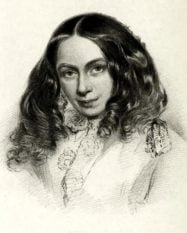
Elizabeth Barrett Browning and Robert Browning are both remembered and revered for their contributions to English literature and poetry, and their love story is also celebrated. After all, it’s Elizabeth who wrote the immortal words “How do I love thee? Let me count the ways” …
The tale of their courtship and marriage is a real-life Victorian romance that includes love letters, an elopement, and the Italian adventure of a lifetime.
The two met in 1845 and eloped the following year. They married on September 12, 1846, much to the disapproval of Elizabeth’s father, who disowned her.
About Elizabeth Barrett
Elizabeth Barrett was born in 1806 and enjoyed a privileged childhood growing up in a country house in Worcestershire, England. When she was fifteen, she developed a serious illness that may have been related to a spinal injury, and had lingering health issues throughout her life, possibly as a result.
Her love poems, including Sonnets from the Portuguese and Aurora Leigh, are the best know among her body of highly respected work. Here is a brief biography of Elizabeth Barrett Browning.
. . . . . . . . . . .
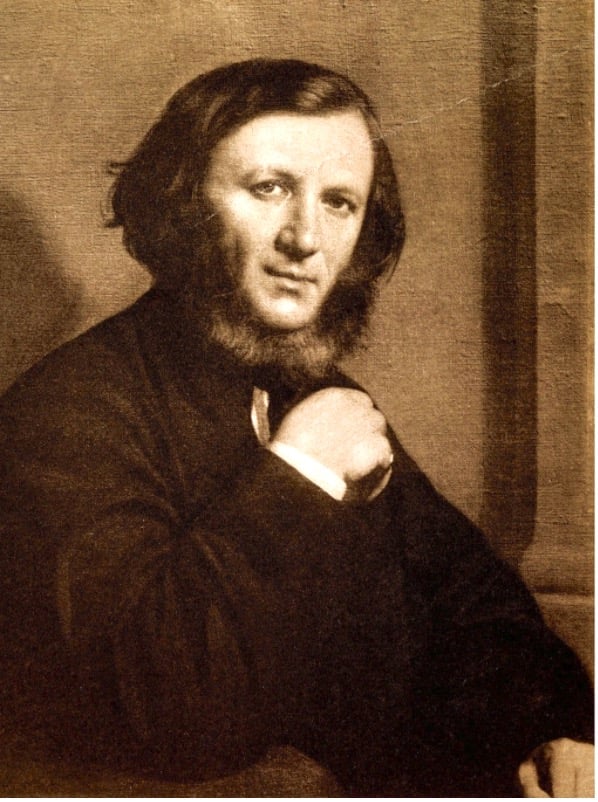
Robert Browning
. . . . . . . . . . .
About Robert Browning
Robert Browning was born in London in 1812. He attended the University of London for one semester and lived with his parents until he was in his mid-30s. In addition to several long poems, most of his plays were written during this early period of his life.
His early works were published with funding from his family. Today, he is particularly renowned for his dramatic monologues and talent for depicting characters in his works. Learn more about Robert Browning.
Letters of Admiration and Love
In 1845, Elizabeth’s second collection of poems, A Drama of Exile, was published and warmly received. The work included lines that praised Robert Browning.
After reading the poems, Robert wrote a letter of thanks to Elizabeth on January 10, 1845, with the tantalizing line, “I love your verses with all my heart … and I love you, too.”
Their correspondence ensued until they met for the first time in the summer of 1845. Over the next several months, they became ever closer. Elizabeth remarked that she and Robert were “growing to be the truest of friends.”
According to her, Robert’s best qualities were fortitude, integrity, and courage in adversity. In all, their courtship went on for twenty months, during which time they exchanged five hundred seventy-five letters. Here’s a passage of one letter from Browning to Miss Barrett:
New Cross, Hatcham, Surrey
“I love your verses with all my heart, dear Miss Barrett,—and this is no off-hand complimentary letter that I shall write,—whatever else, no prompt matter-of-course recognition of your genius, and there a graceful and natural end of the thing.
Since the day last week when I first read your poems, I quite laugh to remember how I have been turning and turning again in my mind what I should be able to tell you of their effect upon me …” (January 10, 1845)
Read this first letter in full, as well as Elizabeth’s response in Robert Browning and Elizabeth Barrett: A Romantic Correspondence.
. . . . . . . . . .
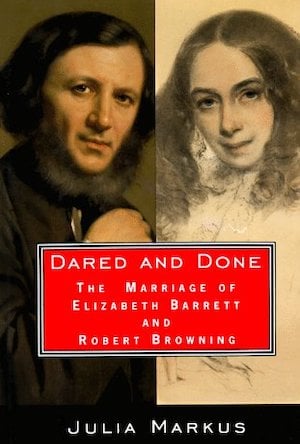
Read about this literary romance in Dared and Done
available on Amazon* and many libraries
. . . . . . . . . .
The secret courtship
Elizabeth’s and Robert’s courtship was kept hidden from Elizabeth’s overbearing father, and Robert’s parents had concerns about whether Elizabeth’s frail health made her a suitable match for Robert.
Elizabeth’s doctors suggested that she move to Italy for health reasons, but her father refused to allow her to go. This refusal led the couple to take decisive action.
On September 12, 1846, they were secretly married at Marylebone Church. Elizabeth’s father wasn’t told, and she continued to live at the family home for a week after the wedding. Then, Elizabeth and Robert moved to Pisa, Italy to begin their life together.
When Elizabeth’s father eventually learned of his daughter’s marriage to Robert, he disowned her, refusing to see her or open her letters to him. Fortunately, after some time had passed, most of Elizabeth’s family accepted her marriage to Robert.
. . . . . . . . .

Elizabeth Barrett Browning
and son Robert Wiedemann Barrett Browning, 1860
. . . . . . . . .
Life in Italy; important works
After spending time in Pisa, Elizabeth and Robert settled in Florence, where they lived at Casa Guidi. Elizabeth’s health greatly improved, and the two poets composed what would later become some of their most well-respected and widely known works. Their son, Robert, was born in Florence in 1849.
Robert and Elizabeth were inspired by their surroundings in Italy, and Elizabeth wrote a significant amount of poetry while living there. Her most famous work, Sonnets from the Portuguese, was a collection of love poems that she wrote in the first few years of her marriage to Robert.
The sonnet that begins with her most famous line, “How do I love thee? Let me count the ways,” is part of this collection. Here is this famed work, with some of the most romantic and heartfelt lines ever put in poetic form:
How do I love thee? Let me count the ways.
I love thee to the depth and breadth and height
My soul can reach, when feeling out of sight
For the ends of being and ideal grace.
I love thee to the level of every day’s
Most quiet need, by sun and candle-light.
I love thee freely, as men strive for right.
I love thee purely, as they turn from praise.
I love thee with the passion put to use
In my old griefs, and with my childhood’s faith.
I love thee with a love I seemed to lose
With my lost saints. I love thee with the breath,
Smiles, tears, of all my life; and, if God choose,
I shall but love thee better after death.
After she shared the sonnets with him, he remarked that they were “the finest sonnets written in any language since Shakespeare’s.”
. . . . . . . . . .

. . . . . . . . . .
Inspired by Italy
Italy plays a prominent role in many of Robert and Elizabeth’s most memorable works from this period. Elizabeth was particularly interested in Italian politics, and she supported the unification of Italy.
In “Casa Guidi Windows,” written in 1851, she describes hearing a child singing a song about liberty on the street outside her apartment. Scholars believe that the poem was intended to increase sympathy for the people of Florence.
Robert’s works from this period were inspired by the history of the Italian Renaissance. For example, “Fra Lippo Lippi,” now considered one of his finest monologues, discusses the life of the title character, a Florentine painter during the Renaissance.
This monologue was published in 1855 as part of Browning’s Men and Women, a collection that also included “A Toccata of Galuppi’s” and “Love Among the Ruins.”
Compared with Elizabeth, Robert wrote relatively little during their marriage. Men and Women didn’t have a very favorable reception, which was disappointing to him. Instead of writing, he tended to spend more time sketching or making clay models during the day.
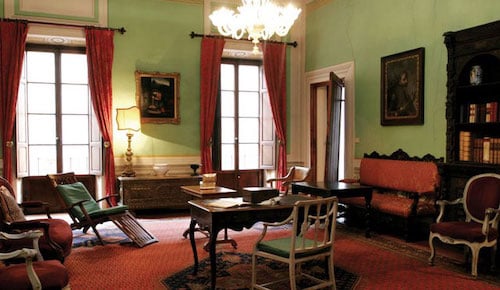
Casa Guidi, where the Brownings lived in Florence
Photo: Italy Magazine
. . . . . . . . . . . .
Robert Browning’s later years, alone
After many happy years together at Casa Guidi, Elizabeth became seriously ill in the summer of 1861. She passed away in Robert’s arms on June 29, 1861. According to Robert, Elizabeth’s last word was “beautiful.”
Robert returned to London with their son in the autumn of that year. Overcome with grief, he spent most of his time alone, and he worked on preparing Elizabeth’s final work, Last Poems, for publication.
Gradually, Robert returned to writing, publishing The Ring and the Book in 1868 and 1869. The work was immediately received with enthusiasm, and it established Robert’s reputation as a top literary figure of the era.
In his later years, he wrote works of incredible fluency. Many of these were dramatic poems or narrative poems that focused on contemporary issues or classical material. Some of his most enduring works from this period include “Prince Hohenstiel-Schwangau,” “Red Cotton Night-Cap Country,” “Balaustion’s Adventure” and “Dramatic Idyls.”
Although he lived in London after Elizabeth’s death, Robert returned to Italy often. On a trip to Venice in 1889, he passed away after developing complications from a cold. Robert Browning was buried at Westminster Abbey in London.
. . . . . . . . .
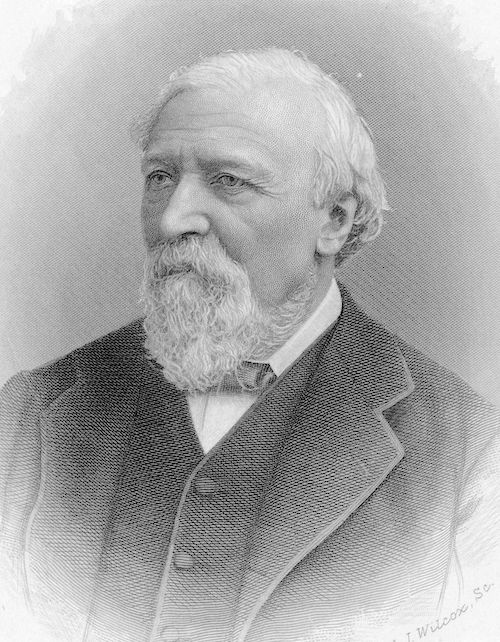
Robert Browning in his later years
. . . . . . . . .
The legacy of the lovers
In addition to being celebrated for their literary talents, Elizabeth and Robert are remembered as people who were deeply in love. As Sir Frederic Kenyon wrote, Elizabeth and Robert “gave the most beautiful example of [love] in their own lives.”
The marriage of Elizabeth Barrett Browning and Robert Browning required courage and sacrifice, and they were willing to do whatever it took to build a beautiful life together.
. . . . . . . . .

Quotes by Elizabeth Barrett Browning
. . . . . . . . .
Sources
- Robert Browning
- Elizabeth Barrett Browning
- Love and the Brownings
- Fra Lippo Lippi
- A Florentine Reformation: The Brownings at Casa Guidi
We studied Elizabeth’s poems for literature classes back in the day, when our teacher shared the brownings love story. It’s beautiful.
Kyrene, indeed, it’s just about the most beautiful real life love story in literature …
Wonderful to read this. I can recapture my student years ( oh, so many years ago!) with this beautiful post of the immortal story of the Brownings.
Thank you!
My mother told me the story of Elizabeth and Robert when I was a child. Thanks so much for refreshing my memory
Thank you for your comment, Carol. It truly is a heartwarming story.
Thanks for sharing. Sharing is caring.
Such a beautiful and informative biography… Thanks alot😍
Thanks for your comment! Theirs is a love story for the ages …
Thanks for posting this beautiful record of marital love!
Thank you for your comment, Denise. It really would have been the perfect love story if Elizabeth’s father hadn’t disowned her for marrying Robert!